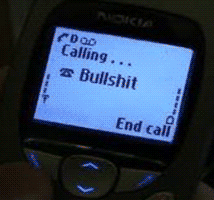I read over that list and it sounds like barely anything, if anything, is changing. It sounds another control freak artist trying to put a scary spin on this because Heaven forbid art be anything other than a means to get them and them alone fame and fortune.
An “orphan work” is “a copyright protected work for which rightsholders are positively indeterminate or uncontactable”. According to what I’m reading about this new law, under the current law “anyone using an orphan work runs the risk that the copyright owner may step forward and bring an infringement action for substantial damages, attorneys’ fees, and/or injuctive relief unless specific exception or limitation to copyright applies”. Even if you acted in “good faith” (i.e., made an attempt to contact the copyright holder), the copyright holder could just pop up years later and sue you if it’s not officially in the public domain yet.
Or, y’know, your YouTube video might get DMCA’d by a copyright patrol bot.
Because people can get sued/DMCA’d/C&D’d/etc. just for using a thing that’s been “orphaned”, orphan works are problematic. For example, take public libraries. There are all these old books, anyone can read them for free. But if someone owning an orphan work pops up and demands that their book not be available for free in libraries, then there’s complications.
The original post is full deliberate cherry-picking and convenient half-truths. The only people who really benefit from orphan works are corporations. Take a look at how video game companies are reselling old games on the digital market. If the Orphan Works Act had been passed years earlier, all those games might very well be subject to public domain. Of course, as SOPA and ACTA proved, everyone hates copyright laws when they clearly benefit Big Business, so corporations spread this idea that “artists” are the ones that lose out here. Tumblr’s full of gullible control freaks, so naturally they took the bait.
From Article I, Section 8, Clause 8 of the United States Constitution:
“To promote the Progress of Science and useful Arts, by securing for limited Times to Authors and Inventors the exclusive Right to their respective Writings and Discoveries.”
Copyright holders do not have absolute control over their works (all you fan artists would get C&D’d left and right if that were true) and they do not get to hold on to their copyright forever. The only thing the Orphan Works Act actually does is put a tighter restriction on how long you can abandon a work before it goes into the public domain.
I recommend everyone read this thing here about orphan works, specifically “Consquences of Orphan Works”.
Tag: Copyright
I have some issues with this:
1. All articles about this issue come from one source. And it isn’t in any way NYT, but “Journal of Biocommunication”. Whatever biology has to do with copyright for artists - I have no clue.
2. “The Next Great Copyright Act” is not a name of the bill, neither official or used by media. In fact, it’s a title of a lecture given by Register of Copyrights Maria A. Pallante. Not a bill, a lecture.
3. This text is full of emotionally charged vocabulary. Putting words like “privilege” or “pressure”, or making sweeping claims about a bill that doesn’t even exist doesn’t make it a viable source.
4. This works both ways. CGP Grey explained it well - remix is not an infringement. And change which would make any form of fair use banned will hurt people like you most. After all, if not laws we have we could be talking about Star Wars remakes made out of art that is in public domain, or: for all of us.
5. Unregistered work is orphaned anyway. Orphaned in this case means that one is unable to find copyright information regarding such piece.
6. This law can’t replace all copyright laws there are, because NO SUCH LAW EXISTS!
In fact, there is a site which has all the information about copyright law review: http://copyright.gov/laws/hearings/
All of that is at the moment a fear-mongering campaign to scare artists into a law which will hurt everyone: from old artists to new artists to public. Fair use, because that’s what apparently fuss is about, allows people to create stuff without worrying about being sued. And now apparently that is something bad.
And a tip: if you don’t want your art to be used in wrong ways, mark under which license the piece is.
ATTENTION ARTISTS
Copyright law is about to change
For more than a year Congress has been holding hearings for the drafting of a brand new US Copyright Act. At its heart is the return of Orphan Works
What does this mean for artists? it means it will make it easier for infringers to steal artists works and harder for people who are making or trying to make a living out of art more difficult. This will effect every artist and all the artwork they have created, are creating, and will be created. Corporates, Big businesses, and publishers want this to pass to make money out off artists works without paying us artists for past, current, and future artwork.
Basic Facts About The Law Being Proposed
- “The Next Great Copyright Act” would replace all existing copyright law.
- It would void our Constitutional right to the exclusive control of our work.
- It would “privilege” the public’s right to use our work.
- It would “pressure” you to register your work with commercial registries.
- It would “orphan” unregistered work.
- It would make orphaned work available for commercial infringement by “good faith” infringers.
- It would allow others to alter your work and copyright these “derivative works” in their own names.
- It would affect all visual art: drawings, paintings, sketches, photos, etc.; past, present and future; published and unpublished; domestic and foreign.** Ways to stop this or preventing these changes from happening**
> > > > > > > DEADLINE IS NEXT THURSDAY: JULY 23, 2015 < < < < < <
- share, reblog this post, spread it for other artists to take notice and action.
- You can submit a letter on how this law can be an issue for you as an artist here.
- Non-U.S. artists can email their letters to the attention of:
Catherine Rowland
Senior Advisor to the Register of Copyrights
U.S. Copyright Office
crowland@loc.govArticles about this - 1, 2, 3, 4
“Right now nobody has to understand copyright law because you’re protected by it, but under the law they are proposing, copyright law wont protect you anymore.”
- Brad Holland (Quote from the video - at 1:23:30)
seriously check this out, really needs to be stopped
I think this is sensationalized, but I’m reblogging this to encourage further investigation. Here’s the Copyright Office’s original report (“Orphan Works and Mass Digitization”).
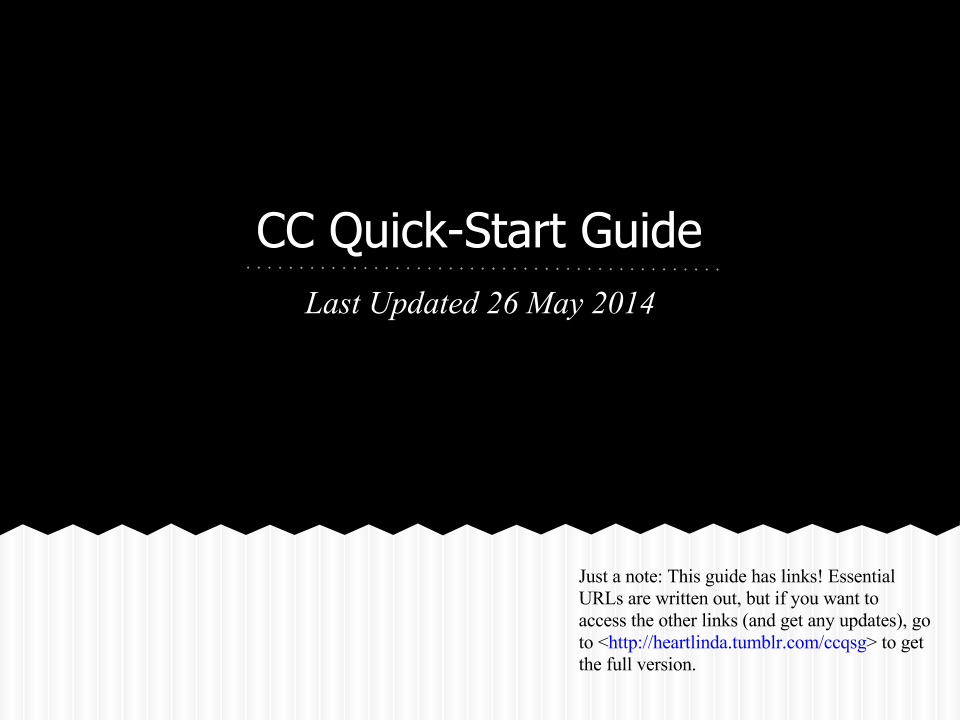
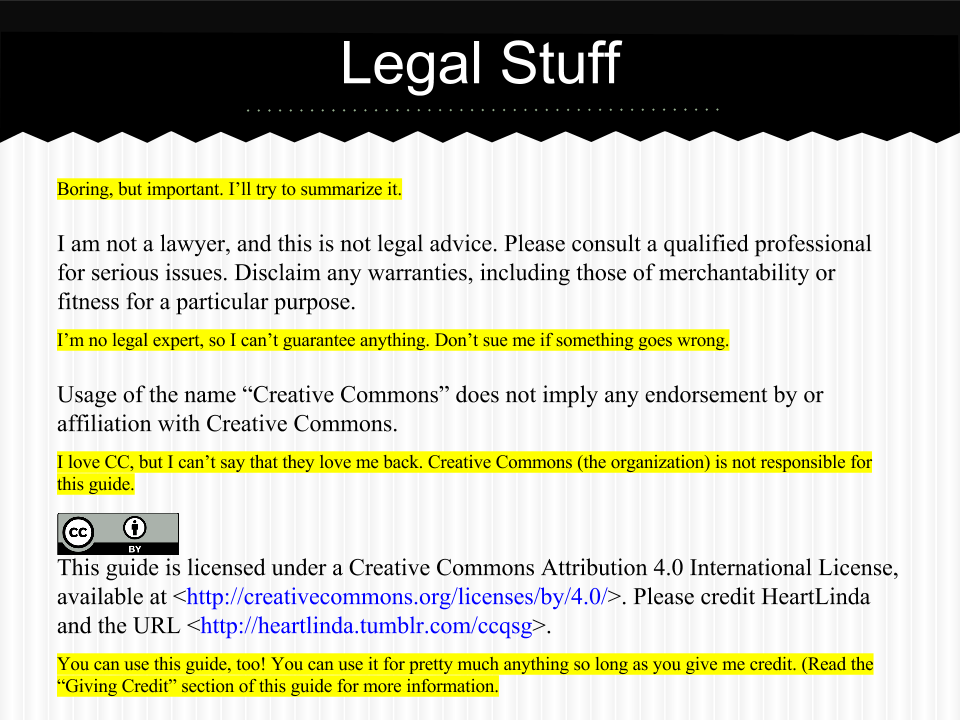
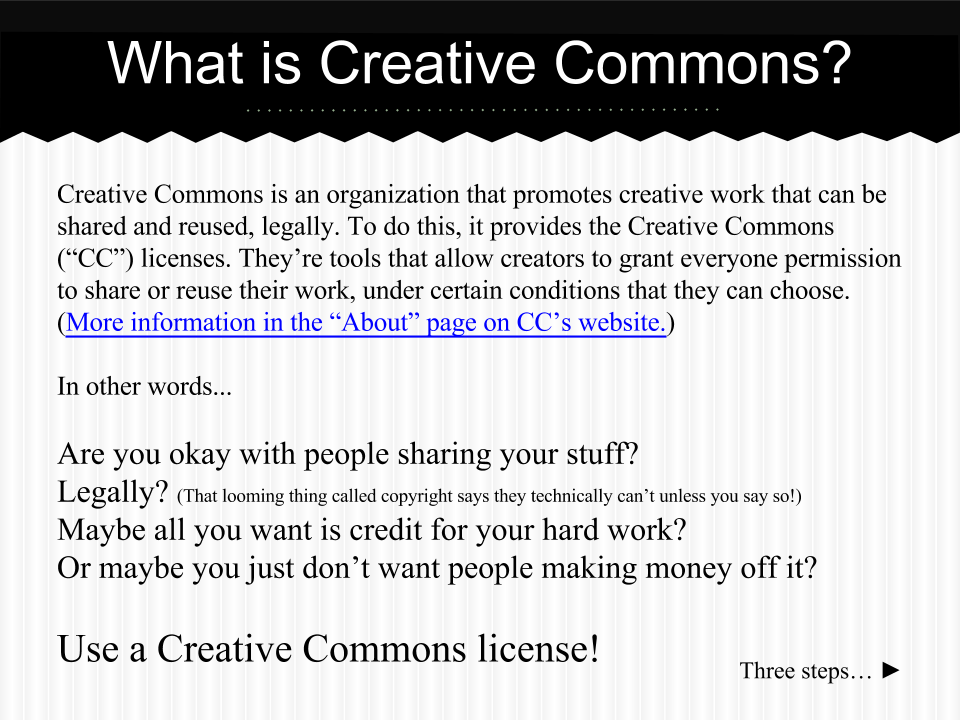
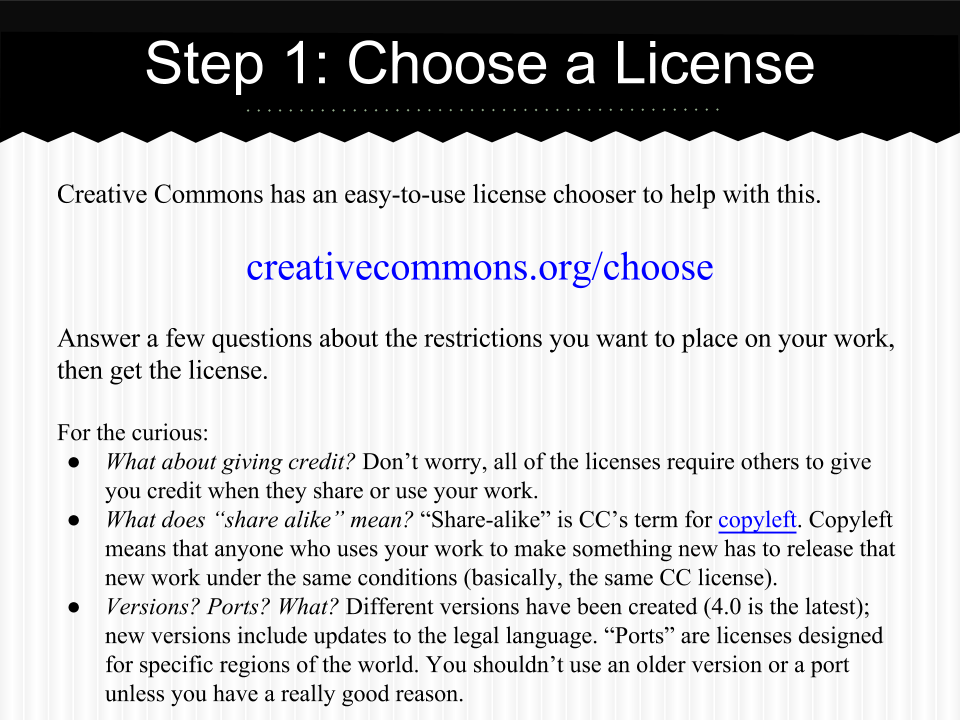
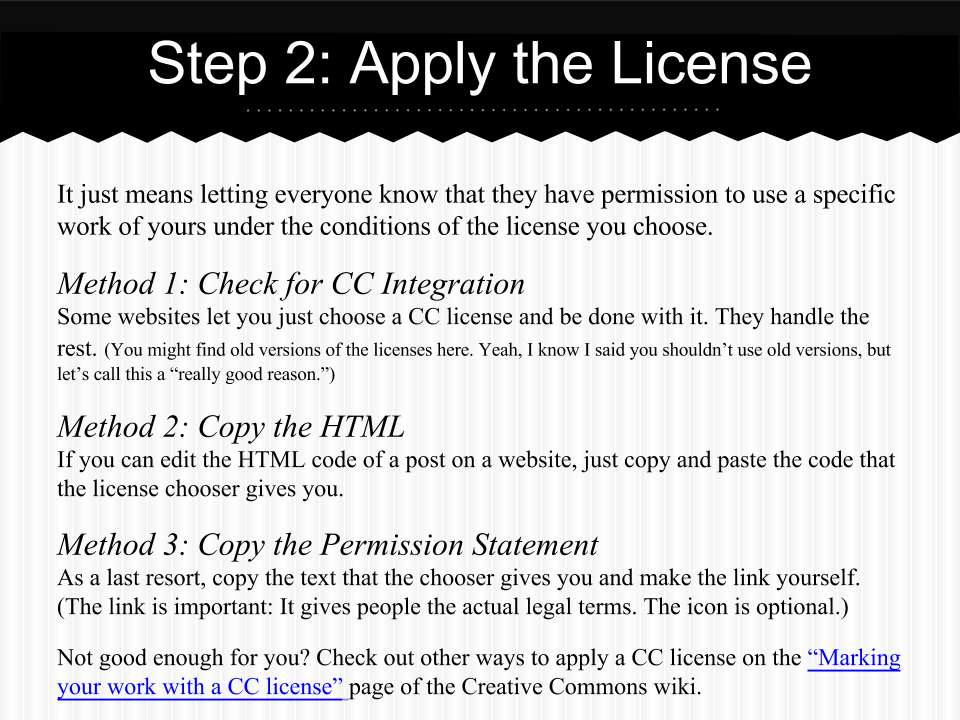
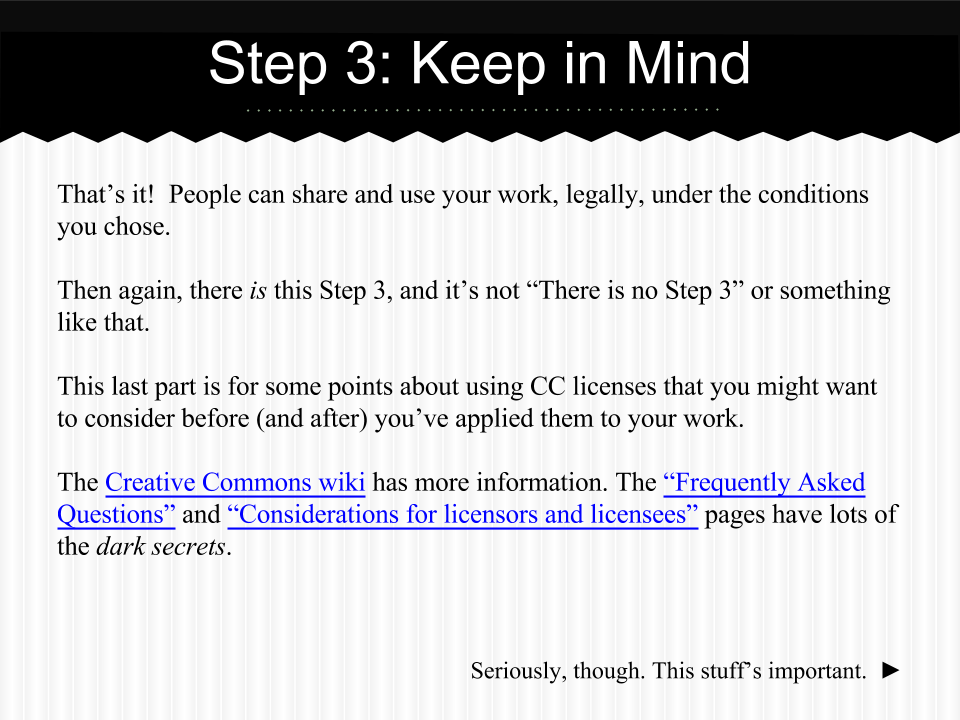
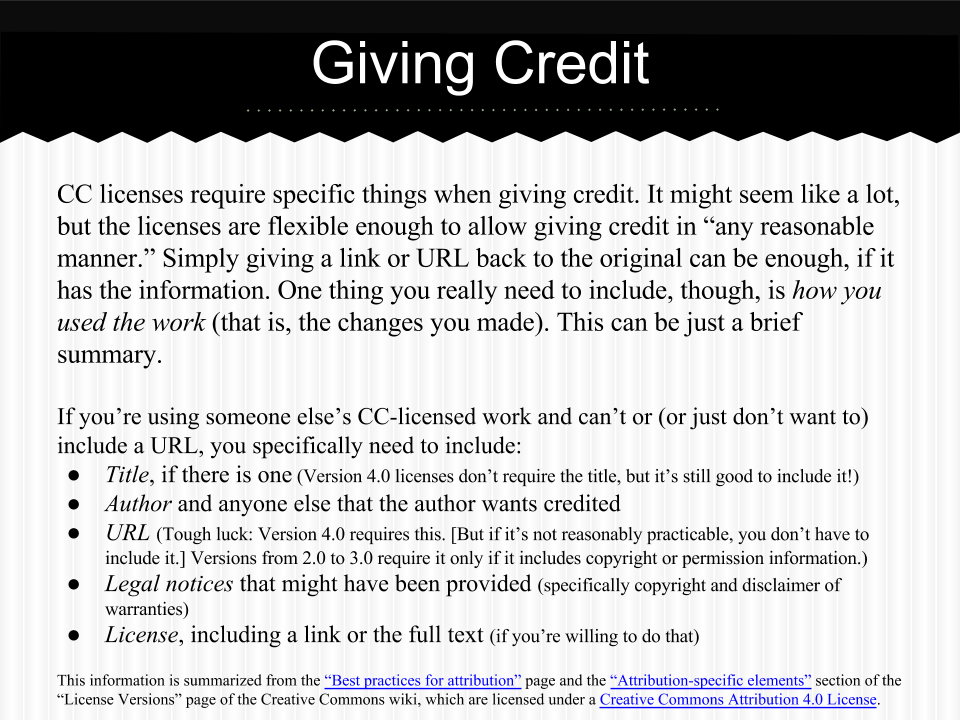
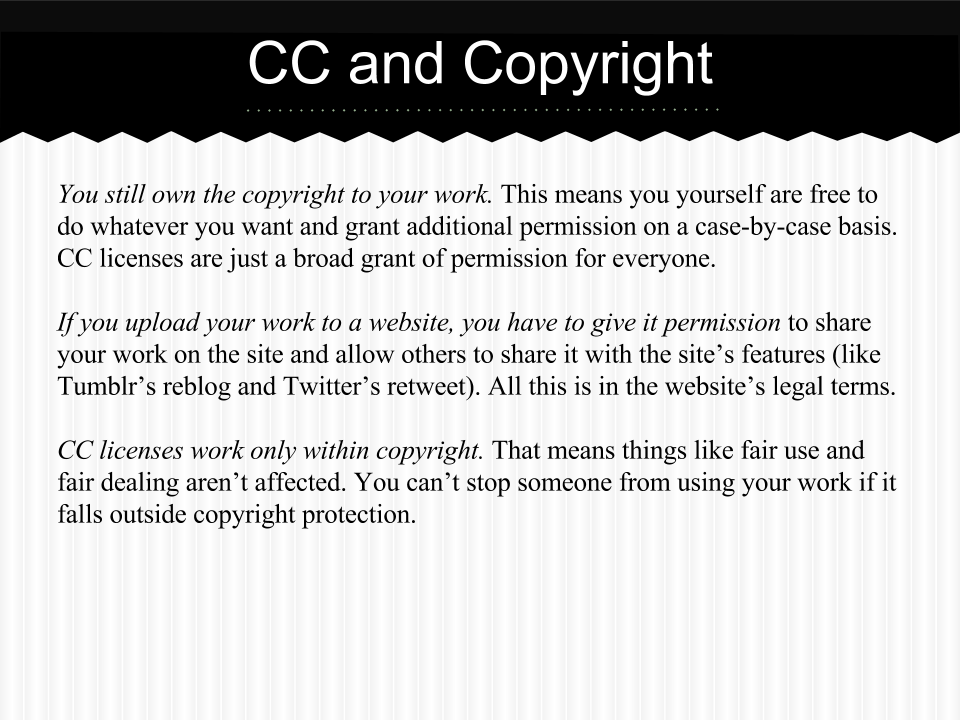
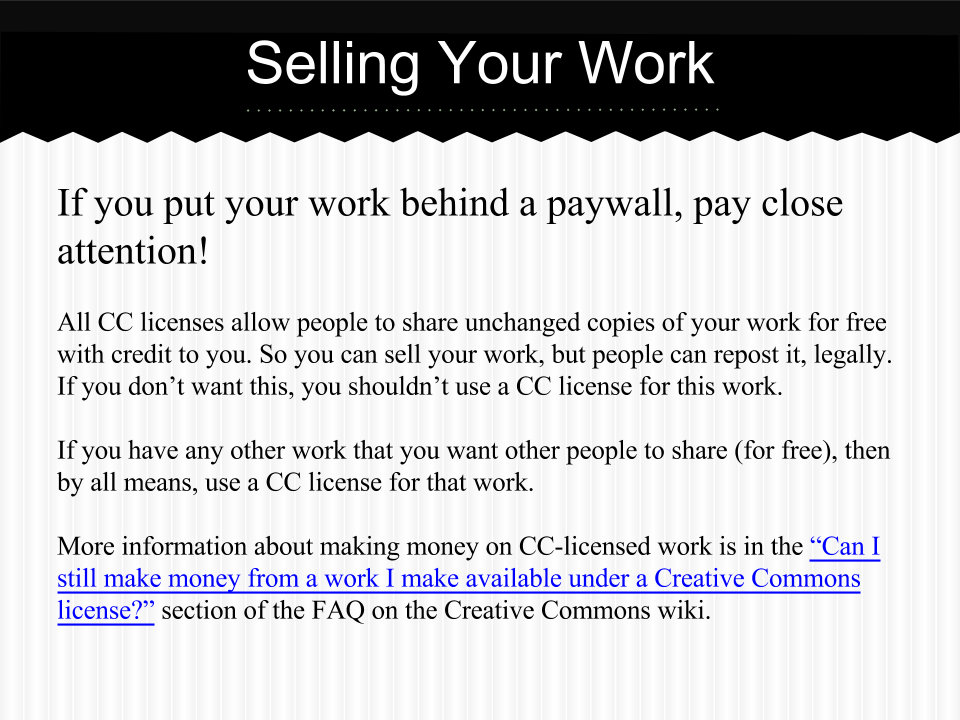
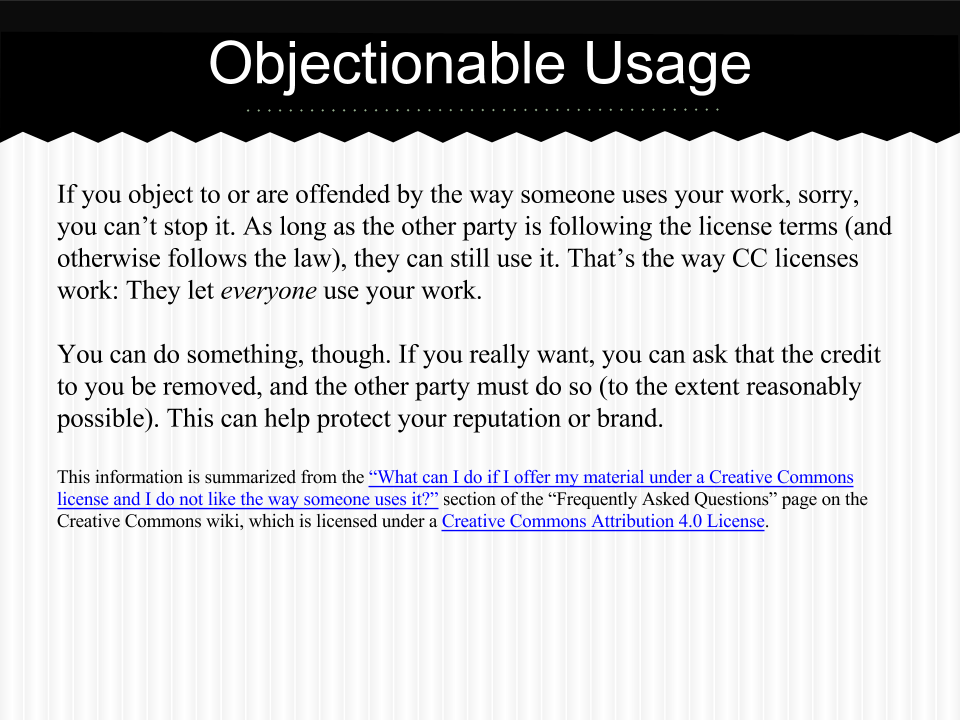
Image set of my Creative Commons quick-start guide for convenience. (I’ll be honest: I limited the presentation to ten slides and provided the image set download specifically for Tumblr.)
Tumblr’s Community Guidelines say that people should reblog things to preserve credit. But what if you don’t mind others reposting it (to Tumblr or elsewhere), as long as you get credit? A CC license lets you grant permission for others to do that, legally.
There’s another side to this that I haven’t stressed enough. Not only to these licenses allow you to give actual permission for others to share your work, they also let them know of any restrictions you might want, especially giving credit. I think that some people who repost others’ work illegitimately have misconceptions about copyright, so they might pay closer attention if there’s something that says “permission is granted as long as credit is given [and possibly other conditions].”
A few issues have come up on this blog about sharing and reusing other people’s artwork, the major ones being reposting paid content and pornographic depictions of “avatar” OCs. Copyright is sometimes brought up against certain usages of art, especially those that an artist would probably be against.
Of course, practically no one wants to break the law, and there likely is a good case to make against these usages. But I think the copyright sort of argument is weaker than it seems. Besides ignoring limitations on copyright like fair use and fair dealing (which are for another time), it ignores the fact that there are lots of things that we do that many artists would accept and even support, but are technically still copyright infringement.
Examples:
- An artist posts art for free on a website (like deviantArt, FurAffinity, InkBunny, or Hentai Foundry [depending on the type of art]). Other people share the art on other sites where reposting art is common (like Tumblr, Twitter, e621, Derpibooru, and Paheal [again, depending on the kind of art]). The artist probably doesn’t mind and might even encourage it, provided that proper credit is given (and the artist isn’t running ads on a personal website or account).
- Someone makes fan art of an artist’s OCs. That artist later leaves positive remark on the fan’s work. The artist might even share it with other fans. It seems clear that the artist is okay with others depicting those OCs.
Even though an artist might be totally fine with these two situations, they’re still illegal in many cases. That’s because copyright says that creators must give explicit permission before anyone shares or uses their work in any way. Many artists don’t give clear permission, even though they probably would if someone asked.
In the paid-content issue, I mentioned Creative Commons (or “CC”) licenses. They make it clear: They’re an easy way for you to give everyone permission to share or use your work, given certain restrictions that you can choose. Doing this gets rid of any legal uncertainty behind reposting your work, which will make the copyright argument stronger.
Granted, some people make an informal statement of permission (“You can use my work as long as you give me credit,” for example), but I recommend CC licenses because using them is easier than spelling out all the conditions, and, more importantly, they’re written using legal language that has a better chance in court.
Sound good? I’ve made a quick-start guide to using CC licenses; check it out!
/t/post/76502131093/just-letting-you-know-on-the-off-chance-you-were
Forget reblogging. I’ll just respond like this, since so far all the respondents are followers. (Follow the link for the original post.)
First, let me clear something up: A request isn’t the only reason I’ll take down content. (And this doesn’t just apply to paid content.)
I’ll be honest: For quite some time I’ve been planning to do an in-depth review of the “Hoof Beat” clop collections from Club Stripes (paid content).
I know people will groan when I pull out the the old “fair use/dealing” argument, and I get it. A lot of these claims would probably fail in court. But it’s worth mentioning since it’s worth comparing this with other things I have done and may do in the future. (DISCLAIMER: I’m not a lawyer, and this isn’t legal advice. A qualified professional should be consulted for serious issues.)
A while ago I remixed “Lustrum” by Mittsies (slightly NSFW). This is in fact paid content; Mittsies is selling it in an album and hasn’t released a free download. (EDIT: It’s still on YouTube, so I guess this doesn’t count as “paid.”) But I’d make the case that this is fair use under United States law because it’s transformative (significantly altered from the original), and because (in my opinion), it respects the commercial market for the original work. (I would think that those who are interested in my freely available remix will probably still buy Mittsies’ original if they were so inclined.)
Of course, posting paid content in its entirety does not really respect the commercial market, which is why I’ll probably remove “Royal Pains.” (And I’ll have to go through all my posts to remove any other paid content. -_-) Oddly enough, though, I might still continue with my reviews of the “Hoof Beat” series. I just won’t post the original. I would think that linking to a copy that someone else posted wouldn’t be acceptable either. But of course, they are still readily accessible, which would explain, of course, how I found it in the first place. This is sort of an “officially silent” stance, comparable to how Ambris announced an Inkbunny profile.
Although posting freely available content usually does respect the commercial market (if any), at times it may not. For example, if someone posts content that was originally made available as “pay-what-you-want,” it might decrease sales since some people might not even know that there is an opportunity to pay the artist. Even if content isn’t “pay-what-you-want,” posting it probably isn’t fair use, either. It’s not really transformative, and it incorporates the entire content of the original.
Finally, I’d encourage artists to explicitly grant permission to others to distribute their work if that’s what they want, in order to avoid the legal technicalities I’ve discussed. I personally recommend the Creative Commons licenses, which give you options how others can (legally) use the work.
Yes, I am aware of Poni Parade and a variety of other paid pornographic projects in this area.
Technically any artwork, whether originally released for free or not, is not “free” (that is, legal under copyright law) to post without explicit consent, unless the artist[s] posted it on Tumblr (in which case people are allowed to reblog it under Tumblr’s terms).
I know that some people post artwork available for free and respect the commercial opportunities of paid work, but I honestly don’t know what I’m going to do to deal with this (especially seeing that sites such as Equestria After Dark don’t really make a distinction).
Of course, if a creator actually requests that it be taken down (basically a cease and desist), then I will respect that request.
EDIT: Follow-up
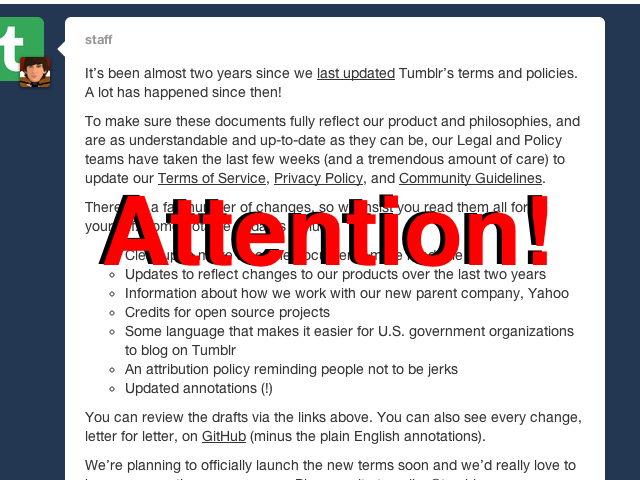
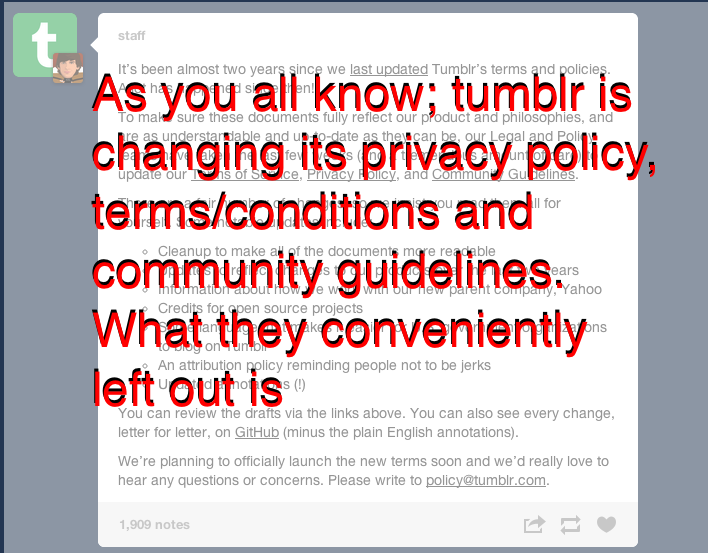
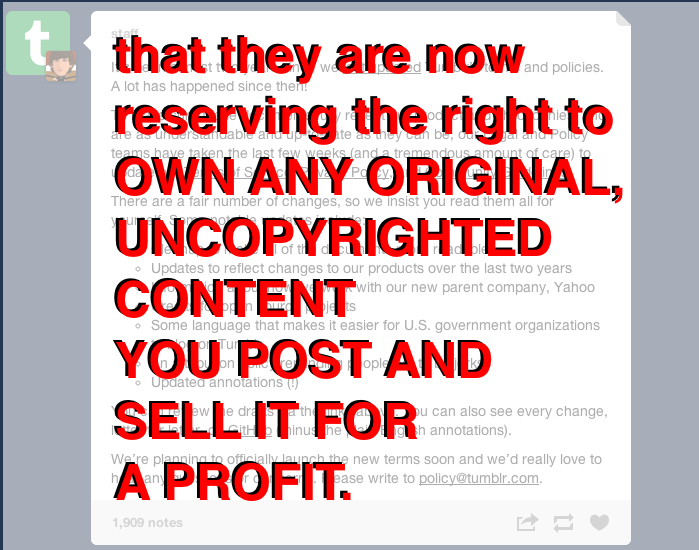
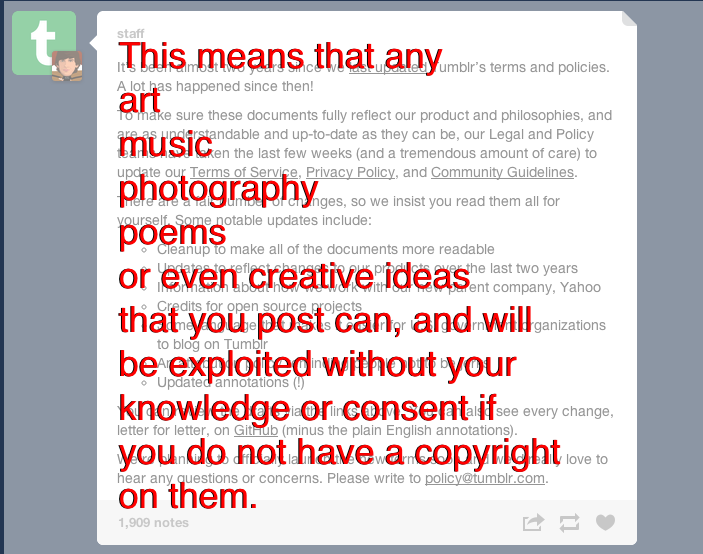
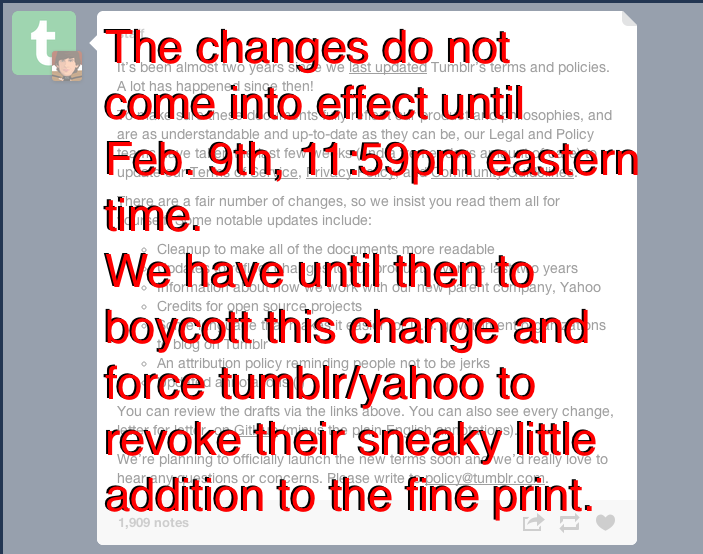
:/
are you kidding me
This isn’t clop but I have a feeling I have some clop artists following me that could use this information if it is true.
DISCLAIMER: I am not a lawyer. If you need serious legal advice, please consult a qualified professional.
First let’s not delve into the actual changes and just take this on its face. According to the third image, this concerns original (created by you) and uncopyrighted (no copyright or you don’t own the copyright) content. This can only mean that the content is in the public domain, in which case anyone can use the work for any purpose. Essentially, you no longer own the work.
Most original work is copyrighted. In most countries copyright is granted when a work is recorded in some tangible medium, including an electronic one. That means when you make something new, you automatically own the copyright.
Now, I may be misinterpreting “original” (and maybe “uncopyrighted”), so let’s look at the fourth image. So Tumblr can exploit content for which you don’t own the copyright? What if someone else owns it and you posted it (legally or illegally)? That would get Tumblr in a lot of legal trouble.
Now let’s look at the actual terms. What I think is being referenced here is Section 6:
“Subscribers retain ownership and/or other applicable rights in Subscriber Content, and Tumblr and/or third parties retain ownership and/or other applicable rights in all Content other than Subscriber Content.” Uh…we are subscribers, so we own our content.
“When you provide Subscriber Content to Tumblr through the Services, you grant Tumblr a non-exclusive, worldwide, royalty-free, sublicensable, transferable right and license to use, host, store, cache, reproduce, publish, display (publicly or otherwise), perform (publicly or otherwise), distribute, transmit, modify, adapt (including, without limitation, in order to conform it to the requirements of any networks, devices, services, or media through which the Services are available), and create derivative works of, such Subscriber Content. The rights you grant in this license are for the limited purposes of allowing Tumblr to operate the Services in accordance with their functionality, improve the Services, and develop new Services. [emphasis added] The reference in this license to ‘creat[ing] derivative works’ is not intended to give Tumblr a right to make substantive editorial changes or derivations, but does, for example, enable ’reblogging,’ [emphasis in original] which allows Tumblr Subscribers to redistribute Subscriber Content from one Tumblr blog to another in a manner that allows them to add their own text or other Content before or after your Subscriber Content.”
This is pretty standard language that you can find on the ToS of pretty much every site with user-generated content. All it means is that you are letting Tumblr use your stuff for the purposes of the site.
Please consider what I have said about copyright before I looked at the actual terms, and if there is something in the terms that seems off, please point out exactly where it is.
*End call.*
EDIT: I have made a few formatting changes for clarity and readability. Also, I have made some grammatical corrections (“look that the” to “look at the”, “ToSes” to “ToS”).

